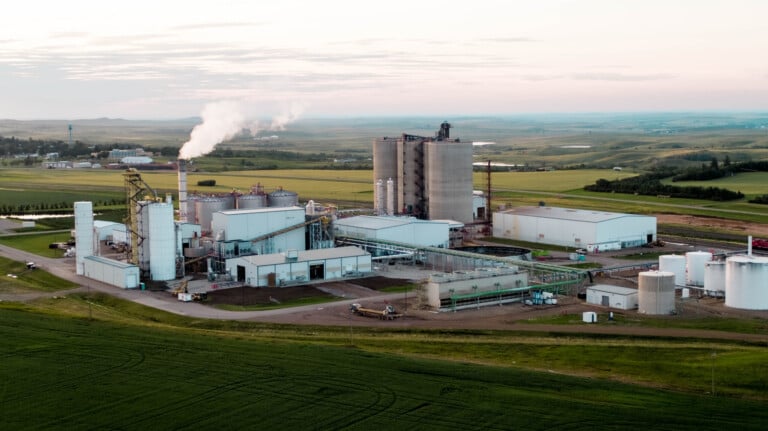Sustainable jet fuel developer plans move to North Dakota amid Summit pipeline delays

BISMARCK, N.D. (North Dakota Monitor) — A sustainable aviation fuel developer plans to shift investment from South Dakota to North Dakota, in part because of delays in the development of the multi-state Summit Carbon Solutions pipeline.
Colorado-based Gevo had obtained a $1.46 billion loan through the U.S. Department of Energy to build a jet fuel plant at Lake Preston, South Dakota. Company officials told the North Dakota Monitor on Thursday that it instead will push ahead with making jet fuel at the Richardton, North Dakota, ethanol plant it bought last year. Gevo is working with the Department of Energy to transfer the loan to expand the North Dakota site.
Red Trail Energy at Richardton in 2022 became the first ethanol plant in the country to capture and store carbon dioxide, taking advantage of its location in an area with the right geology for permanent underground storage.
Gevo plans to expand the North Dakota ethanol plant, which turns corn into fuel. It would convert the ethanol into higher-value aviation fuel in a process it calls alcohol to jet. Carbon capture is a key part of making sustainable aviation fuel.
“We don’t have to share pipelines. We don’t have to wait. We’re already doing it,” CEO Pat Gruber said of carbon capture at the North Dakota site.
Gevo’s South Dakota site relied on the planned Summit Carbon Solutions pipeline to take carbon dioxide to an underground storage site in North Dakota. But the future of that project in South Dakota is in doubt because of landowner resistance and state permitting hurdles.
Iowa-based Summit is seeking to change its pipeline permit in that state. Summit wants to remove North Dakota as the designated end point for the pipeline.
A spokesperson for Summit said Friday the change “keeps open the option to transport CO2 west through Nebraska or north through South Dakota,” reported the Iowa Capital Dispatch.
Gruber said the jet fuel production in North Dakota would be 30 million gallons of jet fuel a year, half of what was planned for South Dakota. But he said the 500 acres at Richardton could allow for expansion.
He said the jet fuel plant would cost about $500 million. Gruber noted that is substantially less than $2.6 billion it planned to spend on the South Dakota site.
Gevo is hosting a meeting Monday to answer questions for farmers and others in the Richardton area. The meeting will be from 6 to 7:30 Mountain Time at WIX Barn near Richardton.
Gruber said building in North Dakota also opens the door to Gevo selling its carbon to the oil industry. North Dakota oil producers could buy the carbon dioxide for enhanced oil recovery — pumping gas into the well to help the well produce more oil.
“This is a great opportunity for us, and we sit right next to Bakken,” Gruber said, referring to the Bakken Formation. North Dakota is the nation’s No. 3 oil producing state, with most of it coming from the Bakken.
Oil industry and state leaders have touted enhanced oil recovery as a way for North Dakota to sustain oil production for decades to come and continue to provide the state with tax revenue.
Gruber said Gevo has started discussion with oil companies, but he said the infrastructure to make enhanced oil recovery possible is still years away.
Ethanol plants are seen as a prime source for carbon dioxide because the gas is captured from the fermentation process of turning corn into ethanol instead of from the burning of fuel.
“It’s pure, concentrated CO2,” Gruber said.
Another benefit of carbon capture for Gevo is the ability to sell carbon credits to other industries with high carbon emissions. Gevo in September announced it is partnering with Biorecro North America on carbon credit sales generated at the North Dakota facility.
Gruber said he was grateful the Department of Energy for working with Gevo on transferring the federal loan, though there are steps remaining to complete the process. Gevo filed a document with the federal Securities and Exchange Commission on Tuesday of its intent to use the loan money in North Dakota.
As for the future of the eastern South Dakota site, Gevo officials said it remains a great industrial location and will be developed.
“The are other things we can do at that site,” said Paul Bloom, Gevo’s chief business officer. “It’s a matter of when.”
But the Gevo officials said the demand for sustainable aviation fuel meant the company could not wait for the Summit pipeline. Summit had hoped to be operating in 2024 but has yet to start construction as it tries to secure all the permits it needs.
“We can’t sit around for that,” Gruber said. “We’ve got a mission here.”
Reach North Dakota Monitor Deputy Editor Jeff Beach at jbeach@northdakotamonitor.com.






